Times Insider explains who we are and what we do and delivers behind-the-scenes insights into how our journalism comes together.
Sometime early last year, I stumbled across an article by two scholars that described the rise of the “Green Islam” movement in Indonesia. One phrase in particular stood out: Muslim environmentalists there saw themselves as “khalifahs,” or guardians, of the earth.
As the Southeast Asia bureau chief for The New York Times, I knew this was a story I wanted to tell. It melded religion and environmentalism — two themes that I wanted to focus on in my coverage of Indonesia, the world’s most populous Muslim nation and a top greenhouse gas emitter. And in a sea of negative headlines, it was a hopeful story.
With Hasya Nindita, one of The Times’s freelance reporters in Indonesia, I started looking for ways to explain the movement. I am based in Bangkok, and at first, I was not sure whether we had enough for a story. I had learned about several initiatives by Muslim activists to promote environmentalism in Indonesia, but it was difficult to tell how broad their reach was. So we kept gathering information.
Then in early November, we heard that Muhammadiyah Green Cadre, the environmental arm of the second-largest Islamic organization in Indonesia, was co-hosting a seminar about Islam’s attitudes toward climate change. Hasya got in touch with the founder of Green Army, a group of tree-planting volunteers, who told her that even though the group did not push an explicit religious message, they were motivated by Islam.
I decided to travel to Indonesia, knowing there would be more stories to tell.
After obtaining a journalist visa, I traveled to Jakarta, Indonesia’s sprawling capital, in early December. On a Thursday morning, I dropped by the Istiqlal Mosque, which had recently installed solar panels and was the first place of worship to win a green building accolade from the World Bank. But when Hasya and I arrived, the staff told us we could not see the solar panels; we needed to make an appointment first.
“OK,” I replied. “But could we talk to the grand imam?”
A few hours later and I was sitting with Grand Imam Nasaruddin Umar, the leader of the mosque, who told us how shocked he was when he began his job in 2016 and saw trash in the river surrounding the mosque. He said he wanted to help transform 70 percent of Indonesia’s 800,000 mosques into “eco-masjids,” or ecological mosques.
The next day, I returned to the mosque for Friday prayers. During his sermon, the grand imam listed all the ways people have been careless toward the environment.
When I heard him say: “The greedier we are toward nature, the sooner doomsday will arrive,” I knew how I wanted to begin my article.
But I knew that going to Jakarta was not enough. Indonesia is the world’s fourth-most populous nation, made up of 38 provinces. If I wanted to understand the significance of a movement, I needed to look beyond the capital.
So the next day, I took a 90-minute plane ride to the city of Yogyakarta, where I met Elok Faiqotul Mutia, a young environmentalist who started an organization that educates youth on climate change. She said that through crowdfunding, her group had raised more than $5,300 for a small mosque, so it could install solar panels.
Hours later, I visited the mosque, along with Hasya and Ulet Ifansasti, a photojournalist. We met the head of the mosque, Ananto Isworo. It was clear that he had been waiting to talk about this topic. For years, he told us, many of his peers had called him the “crazy ustadz,” or the “crazy Muslim teacher,” saying that preaching about the environment had nothing to do with religion.
We went on to Probolinggo, then Lumajang, in the province of East Java. There we met with Aak Abdullah al-Kudus, the founder of the Green Army volunteers. With a group of sixth-graders, we hiked about 500 meters up a hill, where we watched them pray as they planted trees for the first time.
The next day, We returned to Jakarta, and drove about two hours to Bogor to meet with Hayu Prabowo, the head of environmental protection at the Indonesian Ulema Council, the nation’s highest Islamic authority. He had invited us to observe his river cleaning program.
Unlike places such as Iran, where fatwas — religious edicts — can be handed down by individuals, in Indonesia they can only be issued by the Ulema Council. Mr. Hayu was proud of all the environmental fatwas that he had passed. He cited studies that found that fatwas declaring deforestation and the clearing peatlands as haram, or forbidden, were changing attitudes toward those activities in Indonesia.
When I returned to Bangkok, I had to first cover the lead-up to Indonesia’s election. None of the presidential candidates spoke much about the environment.
But as I started to write my article on the Green Islam movement, I thought about the grand imam and all the Muslim environmentalists I had met. I realized that it was individuals who were driving change, not institutions.


























































